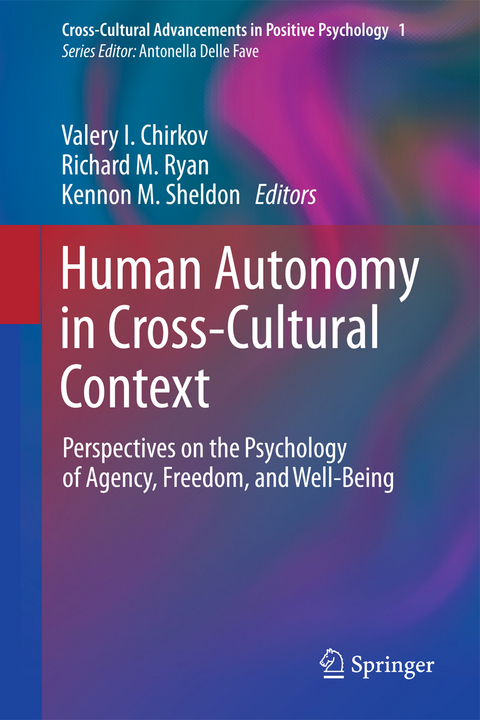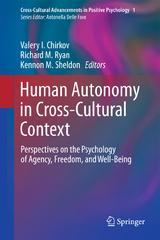Human Autonomy in Cross-Cultural Context
This multidisciplinary team of researchers will collectively explore the nature of personal autonomy, considering its developmental origins, its expression within relationships, its importance within groups and organizational functioning, and its role in promoting to the democratic and economic development of societies. The book is aimed toward developmental, social, personality, and cross-cultural psychologists, towards researchers and practitioners’ in the areas of education, health and medicine, social work and, economics, and also towards all interested in creating a more sustainable and just world society through promoting individual freedom and agency.
This volume will provide
a theoretical and conceptual account of the nature and psychological mechanisms of personal motivational autonomy and human agency;
richmultidisciplinary empirical evidence supporting the claims and propositions about the nature of human autonomy and capacities for self-regulation;
explanations of how and why different psychological and socio-cultural conditions may play a role in promoting or undermining people’s autonomous motivation and well-being,
discussions of how the promotion of human autonomy can positively influence environmental protection, democracy promotion and economic prosperity.
Valery Chirkov received his Ph.D. in social psychology from the University of Rochester, Rochester NY. He is an associate professor in Culture and Human Development and Applied Social Psychology programs in the Department of Psychology at the University of Saskatchewan, Saskatoon, SK. His research interests concern the application of self-determination theory of human motivation in cross-cultural research, psychology of immigration and acculturation, culture and well-being.
Introduction. The Struggle for Autonomy in Personal and Cultural contexts: An Overview, Valery I. Chirkov, Kennon M. Sheldon, and Richard M. Ryan.- Part 1. A Theoretical Context of Human Autonomy, People’s Well-Being, and Happiness.- 1. Positive Psychology and Self-Determination Theory: A Natural Interface, Kennon M. Sheldon and Richard M. Ryan.- 2. A Self-Determination Theory Perspective on Social, Institutional, Cultural, and Economic Supports for Autonomy and their Importance for Well-being, Richard M. Ryan and Edward L. Deci.- 3. Dialectical Relationships among Human Autonomy, the Brain, and Culture, Valery I. Chirkov.- Part II. Human autonomy across cultures and domains of life: health, education, interpersonal relationships, and work.- 4. The Role of Autonomy in Promoting Healthy Dyadic, Familial, and Parenting Relationships across Cultures.- C. Raymond Knee and Ahmet Uysal.- 5. Do Social Institutions Necessarily Suppress Individuals’ Need for Autonomy? The Possibility of Schools as Autonomy Promoting Contexts across the Globe, Johnmarshall Reeve and Avi Assor.- 6. Well-being, Physical Health, and Personal Autonomy, Geoffrey Williams, Pedro J. Teixeira, Eliana Carraca, and Ken Resnicow .- 7. Autonomy in the Workplace: An Essential Ingredient to Employee Engagement and Well-Being in Every Culture, Marylène Gagné and Devasheesh Bhave.- Part III. Human autonomy in modern economy, democracy development, and sustainability.- 8. Capitalism and Autonomy, Tim Kasser.- 9. Economy, People’s Personal Autonomy, and Well-Being, Maurizio Pugno.- 10. The Development of Conceptions of Personal Autonomy, Rights and Democracy and their Relation to Psychological Well-Being, Charles C. Helwig and Justin McNeil.- 11. Personal Autonomy and Environmental Sustainability, Luc G. Pelletier, Daniel Baxter, and Veronika Huta.
| Reihe/Serie | Cross-Cultural Advancements in Positive Psychology ; 1 |
|---|---|
| Zusatzinfo | XIV, 286 p. |
| Verlagsort | Dordrecht |
| Sprache | englisch |
| Maße | 155 x 235 mm |
| Themenwelt | Geisteswissenschaften ► Psychologie ► Allgemeine Psychologie |
| Geisteswissenschaften ► Psychologie ► Humanistische Psychotherapien | |
| Geisteswissenschaften ► Psychologie ► Psychoanalyse / Tiefenpsychologie | |
| Geisteswissenschaften ► Psychologie ► Sozialpsychologie | |
| Studium ► Querschnittsbereiche ► Prävention / Gesundheitsförderung | |
| Sozialwissenschaften ► Soziologie ► Empirische Sozialforschung | |
| Schlagworte | Autonomie |
| ISBN-10 | 90-481-9666-3 / 9048196663 |
| ISBN-13 | 978-90-481-9666-1 / 9789048196661 |
| Zustand | Neuware |
| Haben Sie eine Frage zum Produkt? |
aus dem Bereich




